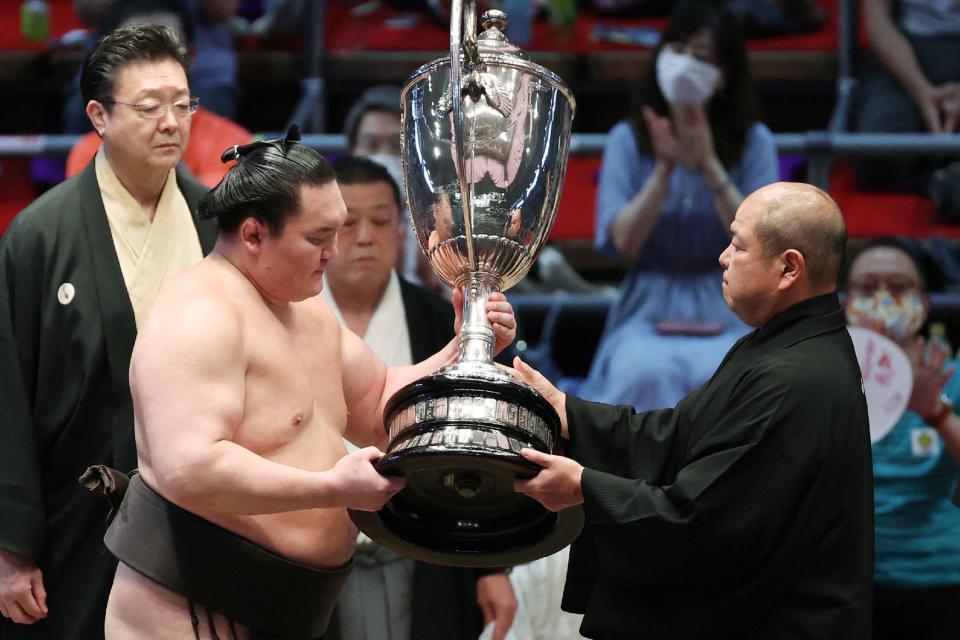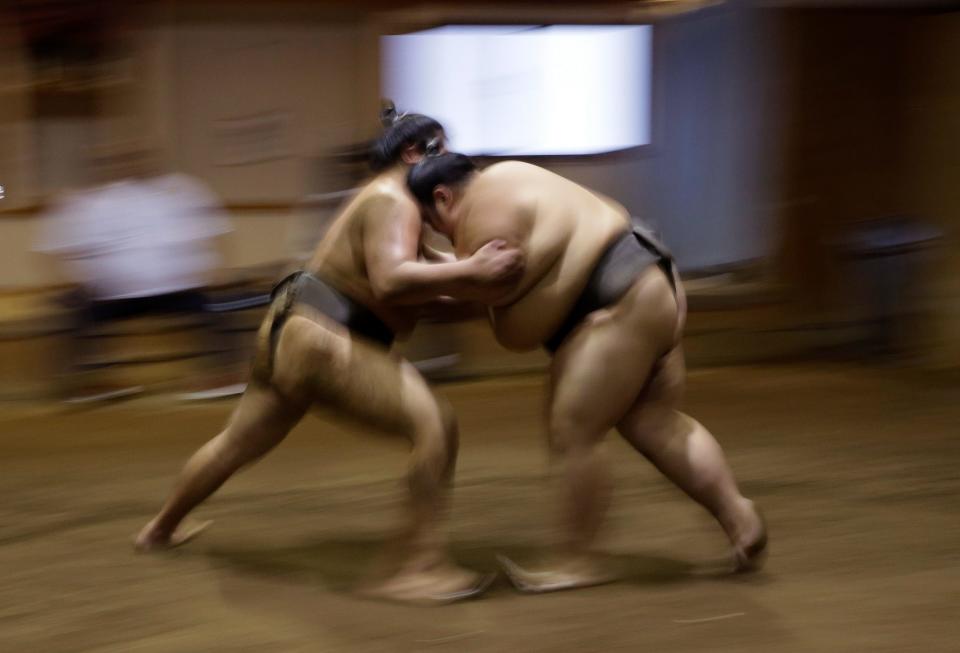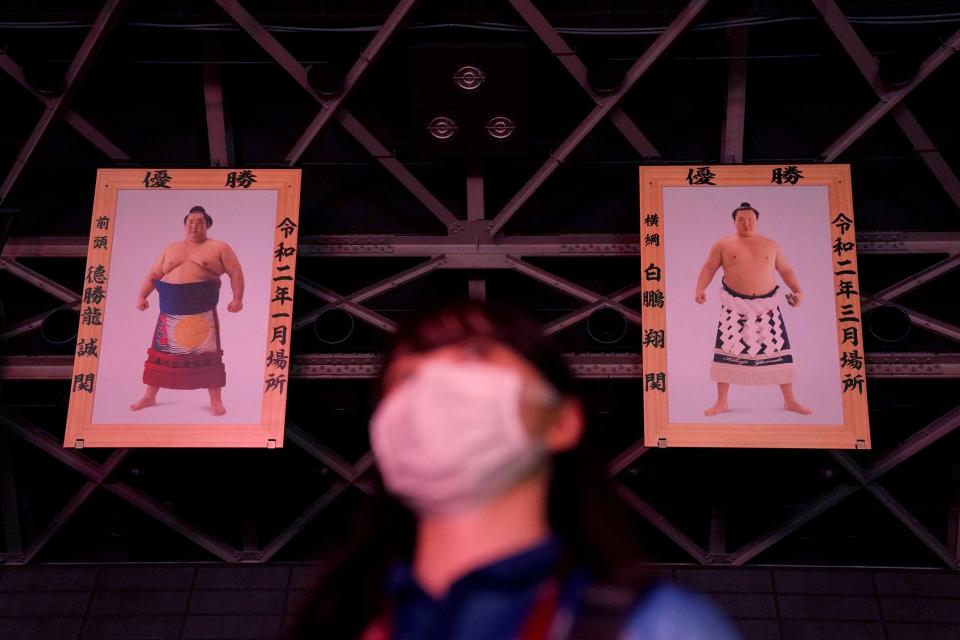'We try to break the stigma': Does sumo wrestling have an Olympic future?
Corrections and Clarifications: A previous version of this story misidentified Hakuho Sho's status. He is an active wrestler.
In July, two of sumo wrestling’s greatest competitors came head-to-head in the finale of the Nagoya Grand Sumo Tournament: Hakuho Sho squared off against Terunofuji Haruo .
Ask Justin Kizzart, a member of the U.S. Sumo Federation, about the match and he’ll tell you it was a battle between the Michael Jordan of sumo and the ultimate underdog story in Terunofuji, who spent two years recovering from knee injuries. Both came into the championship with perfect 14-0 records but in the end, it was the older veteran Hakuho who came out victorious, capturing his 45th Emperor’s Cup.
From the moment the two first made contact in the middle of the mat to when Hakuho threw Terunofuji to the ground, only about 20 seconds had passed. But in sumo wrestling, that can feel like forever.
Hakuho was supposed to have one final hurrah after the Olympics’ closing ceremony, but the post-Olympic tournament was cancelled. It’s been a lifelong dream for Hakuho to compete in the Games – after watching his father wrestle for Mongolia in the 1964 Tokyo Games – but this is as close as he’ll get to competing in the Olympics.

In 2018, sumo wrestling was recognized as a sport by the International Olympic Committee, but it is not yet an event at the Games. It’s not for lack of trying: the uniquely Japanese sport has spread beyond the country’s borders, and two of its top wrestlers listed above are actually Mongolian.
Sumo is now popular in places like Ukraine, Russia and Egypt. It’s also slowly finding its footing in the United States, where an American style of sumo has developed. For Kizzart and fellow USSF member Joshua Clements, it was love at first sight when they were introduced to the sport and it’s because of what they saw, coming from martial arts backgrounds.
“Sumo can be extremely technical but it’s more technical in a primal fashion than it is in a chess game,” Clements said. “It’s not chess. It’s not even checkers. You’re trying to use force and velocity and strategy combined. It’s different in its sophistication but it’s not sophisticated at first glance, which makes it a spectator friendly sport.”

Clements has seen firsthand how much the sport can draw people in. Each year, his hometown of Atlanta hosts a Japan Festival, which draws in thousands of attendees. He said the last time they did a sumo demonstration it was in front of a packed crowd.
So, in regards to sumo wrestling becoming an Olympic event, it’s because of the fan presence that Clements thinks it’s certainly possible. He knows the sport has fans but he’s not sure about the financial side of it, or whether there are enough competitors internationally for a spot in the Olympic lineup to be viable.
Sumo, or at least Japan's arena for the sport, will be part of the Olympics. Kokugikan Arena, the spiritual home of Japan's national sport, will house the boxing events for the Tokyo Games.
Boxing events at Tokyo2020 will be held at Kokugikan Arena.
The 7300 capacity indoor venue is home of the Japanese national sport sumo wrestling. It is designed in a bowl shape to allow spectators to easily view the sumo bouts in the centre of the auditorium. pic.twitter.com/4swNeUIF19— Boxing Federation of Kenya (@KenyaBoxing) July 17, 2021
In the United States, at most a dozen or so competitors from a handful of states – like Florida, Texas and California – will meet in tournaments. Growing sumo is difficult, especially when stereotypes about the look of the athletes and the nature of the sport still exist.
“Here in America, we’re just trying to get people to get out of the stigma of just being fat dudes wrestling,” Kizzart said. “Yes, this sport is in over 32 countries. Yes, this sport has men and women and yes, this sport has different weight classes. Those are the three things that we try to break the stigma of.”
Ed Suczewski, president of the USSF, feels different. He admits he's typically on the lighter-weight side of the sport but he also appreciates the importance of the athletes that fit that stereotype.
"A big part of the sport is large men in mawashi [sumo loincloth] going at each other, and I think that's fine," Suczewski said. "I never felt like I needed to say 'oh, well there are lightweights' to somehow legitimize the sport. But a lot of people might think they have to be big in order to compete.
"Anybody that says it's just fat guys pushing each other, yeah they're just looking at the sport. But that's like saying chess is just moving pieces around a board. There's a lot more going on beneath the surface."

Regardless, changing those views of sumo and growing the sport in the United States could start as early as next summer, when the World Games are hosted in Birmingham, Alabama. Kizzart said the World Games are like the Olympics for every athlete whose sport isn’t in the Olympics. That could be the next step toward growing sumo wrestling in the States.
“I do want the sport to be taken as serious as football or baseball, or wrestling,” Kizzart said. “I just wouldn’t want us to be behind the curve. A generation behind the curve, because some of us are aging out.”
Clements echoed his friend’s sentiment, “We’re not doing this for big money or whatever. We’re just doing this because we enjoy it. We love it, and we just want other people to see that and grow the sport.”
Contact Alyssa Hertel at ahertel@usatoday.com or on Twitter @AlyssaHertel.
This article originally appeared on USA TODAY: Sumo an Olympic sport? Sport's future looks bright after Tokyo Games

